(Click on the letter to enlarge it for reading.) It’s interesting that Harold refers to Mildred’s “reformation.” I can’t imagine my father talking to me about my mother in that way.
Harold refers to the “threshing gang” at the farm; Dick tells more about this in the section of his autobiography on this page.
Dick was an only child; as he explains in the section of his autobiography on this page, his parents could have no more children after he was born, and his Aunt Tirzah and Uncle Frank lost several children before they were born. So Dick “belonged” to his aunt and uncle almost as much as he belonged to his parents.
Aunt and Unc, as he called them, had a 145-acre farm near Plainfield, Indiana, and Dick would often spend the summers there, and weekends during the school year. He loved being “on the farm,” and you can feel that love through his writing about it that is reprinted below.
Phone calls out of town in those days were “long distance” and quite expensive. They were to be avoided, except in cases of emergency; you never called long distance just to chat. (It was the same when I was growing up.) So when Dick was out at the farm in the summertime, letters were the primary means of communication. Two of them, written to Dick from his father Harold, have been preserved for us. They do not deal with matters of consequence, but the quality of the family relationship is revealed in them.
Below are pictures of the farm, and pictures of Dick through the years as he spent time there. The best pictures of the farm, however, are the ones that this section of Dick’s autobiography will draw in your mind as you read it. It’s a wonderful account.
The first sentence of this letter must be a joke; it was July in Indiana! Dick and his dad were apparently fans of the Indianapolis Indians baseball team, who were (and still are) a minor-league affiliate of the major league team in Cleveland.
Harold made use of the letter to dispense some fatherly advice; Dick was a boy scout, and apparently aiming for “first class” rank at the time of this letter.
The wide landscape image above is a photo of the Jessup farm copied from a large framed print that was handed down to us in the family archives. The color pictures below it were taken on more recent visits to the farm site.
Much time in these early years was spent on Aunt & Unc’s farm in Plainfield, Indiana. My regular routine was to go out to the farm on Saturday mornings and then come home with Mom & Dad on Sunday evening. Mom & Dad would always come out for dinner after church on Sunday. Mother would take me to meet Aunt about half way between our homes or sometimes I would ride the bus to Plainfield, get a haircut downtown, and then call Aunt to come pick me up. Saturday afternoons were always spent with Unc in the field at whatever crop he was tending. I would spend almost all of the summers on the farm and much of my other vacation time. I always went with my parents, however, on their vacation trips. These were special times for the three of us. At times I had wished that I had brothers or sisters, but I also enjoyed having the full attention of my parents and Aunt & Unc. No siblings were possible after I was born and Aunt was never able to have children. She had four or five sons, all still born. What a heartache this must have been.
We all had great fun on those Sunday afternoons. The only work Unc did on Sunday was milk the cows as this could not be neglected even for one day. This left much time free for him to be with the rest of us. We usually all played croquet together and played partners. Dad was always my partner as he was always my catcher when I pretended to be a baseball pitcher. I can still remember him telling me I had a good arm and I could really pitch that ball. Our croquet games were Dad & I against Mother and Unc and we all played as if the world depended on the outcome. Aunt would always say she didn’t want to play and would just rather watch; I doubt if this was true. They had a beautiful rectangular lawn that was just perfect for a croquet layout. After two or three games we would gather our eggs, dressed chickens and milk and head back home to Indianapolis. I remember Dad working many long hours in those days as drug stores were always open it seemed. Occasionally he had to work some on Sunday, but more about that later.
Time on the farm was very precious and many times I have wished that my children could have had this experience. The farm consisted of 145 acres with 30 or 40 of these being woods, about 10 taken up with house and buildings and pasture, and the rest cultivated for crops. A beautiful white fence separated the house and yard from the pasture. It was an exquisite white farm house with endless rooms. A full basement included the furnace in one room and in the other, a shower, washer and dryer (in later years) and the egg incubator. During the weeks before the hatching of the chicks, Aunt would turn the eggs in the incubator twice a day. She was very meticulous about this and I was not allowed to help. The first floor of the house contained a large kitchen, separate dining room, a living room, one bedroom, a half bath, a parlor where the player piano and the old secretary were housed, and a large hallway containing the stairs to the second floor. On that floor were three more bedrooms (Aunt used one as a sewing room) and a full bath. In the winter time they slept upstairs as it was warmer there and in the summer they used the downstairs bedroom. I usually slept on a cot downstairs or in one of the extra rooms upstairs. There was a spare room in the corner of the house that Unc used as a seed corn room. An attached wash room and wood storage room were to the back of the house where we all took baths in a round tub with hand carried water before the new plumbing was installed in the house.
A small creek ran through the farm that was always referred to as the branch. The branch was never too deep but what a person could easily transverse it without getting wet. It would freeze over in the winter. Aunt also had a vegetable garden that was at least a quarter acre. I picked many a strawberry out of that garden. The buildings consisted of two barns, a two car garage, a milk house where the milk was stored in huge cans and submerged in water to keep cool, and a large white farmhouse with an attached wash house. Along side the house was a tall wind mill that at one time was used to pump water, but now served only as a lightning rod. There were many storms over the years that this wind mill was struck and saved the house. Sometimes it would kill the ivy growing the entire length of the structure. There were six separate cultivated fields of varying amounts of acreage and Unc had his crop rotation down to a science so as to not wear out the soil unnecessarily. The fields were all separated by fences so he could turn live stock into them to clean up and feed for a while after most of the crop was harvested. His equipment consisted of a large red Farmall tractor, various cultivators, plows, wagons, and three farm horses. Two of the horses were used exclusively as beasts of burden while ol’ Kate was a fun horse that I could ride. I learned to ride bareback with just a bridle to hang on. Once this was not enough as I got her going up a steep hill too fast and off her rear end I went. I don’t remember being hurt, but I never tried that again.
I used to ride Kate into the woods to get the cows for milking time. As I remember there were about 15 cows milked twice daily, but I never got up early enough in the morning to do that chore. I never really thought of it as a chore because I really loved to ride that horse. In the evening just before milking time most of the cows would know when to start gathering at the gate to be brought to the barn. However, there were usually two or three that I had to go search for in the woods. When I had them all rounded up at the gate from the woods to the pasture then I would open the gate and off they would go to the barn as they knew the routine very well. Upon arriving at the barn they would go single file to their stall and be tied to the front of the stall and wait for the milking machine. I was not allowed to get involved with these machines and I didn’t have the skill to strip the cows after the machines were through to be sure we had all the milk. My job during milking was to clean up after the cows if they messed in the barn. This was not my favorite job on the farm, but I always wanted to be around Unc at whatever he was doing just to be with him. I didn’t want to stay in the house unless it was raining or was just too cold to be outside.
Harvest time was an exciting time; there was always so much going on. Unc always had to hire extra help for some of the harvesting. He did have one helper that he hired on a year round basis. He and his family lived in a small ‘tenant’ house down by the road. The main house was set back from the road about 200 yards. There was some change over in helpers, but not too often. The one I remember most was Wayne Phillips and his wife, Laura, whom we have visited in later years. They were special people and Unc did all he could to keep this family. He and Aunt eventually led them to the Lord and they have become good Christians. I would tag along with Wayne much of the time probably getting in his way more than being helpful. I remember his wages at one time were $9.00 per week, a chicken on Sunday, and all the milk he wanted every day. This had to be sometime in the 30’s. As far as I know the Phillips still live in Plainfield.
When it came time to harvest the wheat it was the highlight of the summer except maybe for the lightning bugs and catching them to put into jars. In those days most farmers used a threshing machine rather than a combine as they wanted to save the straw to bed down the live stock in the winter. These machines were too expensive for each farmer to have his own, so a group of them would get together and one would have this monster machine and it would be moved from farm to farm until harvesting was done. Each farmer would contribute a horse drawn wagon and one helper and move from farm to farm as the thresher would go. The idea was to get the wheat harvested as quickly as possible and then move on for you never knew when it was going to rain and you could be held up for days. Dinner time for threshers was a sight to behold. Of course dinner time was at noon and it was the responsibility of the farmer’s wife to put on a spread of food enough to feed an army it seemed to me. All the work stopped at noon and into the house would come all the workers and could they eat! Aunt would fix dish after dish of food, salads, fried chicken, green beans, mashed potatoes, gravy, apple sauce and more pies than I could count. The fellowship for those farmers was great and the whole process is something I will always remember.
My job during the harvesting at our farm and close by farms was to ride ol’ Kate and carry water to the men in the field who were pitching the wheat onto the wagons. They got mighty thirsty at this job. Come late fall, the time came to shuck corn in the fields and this could be a very cold job as it had already frosted a few times. It was not always easy to pull those ears from the stalk and toss them into the wagon that you were trailing through the field. I usually didn’t last too long at that job.
Other memories of the farm include learning to drive the tractor (even before I could drive a car), raising my own breed of chickens, but letting Aunt kill and dress them for me to sell, and laying on the floor around the radio and listening to all my favorite programs. Wash day was always on Monday, and you had better keep your fingers away from that wringer. Tuesday was ironing day, Wednesday and Thursday were cleaning days and Friday was spent mainly in the kitchen getting ready for the weekend. I can still remember those frozen sheets coming off the line as I sometimes helped with the gathering of the clothes. Fryers were usually not big enough to dress until around Dad’s birthday, June 25, and Aunt would always save this time to fry her first chicken of the year. When it came to driving the tractor, Unc used to let me pull the disk or the rotary hoe or some other tool before the crops were planted. I was not allowed to plow corn or use other tools on other crops and I can understand that now. I was also never allowed to be up on the wagons when a farmer was pitching the wheat into the threshing machine; there were too many accidents of people falling onto the conveyor belts and being drawn into the machine.
On Sundays we would attend church at Plainfield Friends that was also the headquarters of Western Yearly Meeting and still is today. There are two large meeting rooms in the building plus Sunday School rooms and a full basement. One or two years during Yearly Meeting sessions I was chosen to be a page and set up on the front platform. I would look for people who wanted to send written messages to someone and I would get the message and take it to the appropriate person. I got to know many names in this job and I enjoyed listening to what was going on. The meals for the YM were all fixed in the church basement and this was like threshing season all over again.
Unc served Plainfield Friends as Treasurer for many years and the first thing we did after Sunday dinner was count and record the offering, and I was allowed to help. Maybe this got me interested in becoming a church treasurer later in my life. Aunt served on the Pastoral committee as well as other tasks and I can remember the phone being in use plenty of time in the evenings. They were on a party line and you always had to listen to see if someone was using the line before you dialed. To get long distance you always had to go through ‘central’ and give verbal instructions of the number and person you wanted to talk with. “Central” was the name used for Operator today. I also remember enjoying watching the big red squirrels that were on the farm; they were very beautiful and very fast at climbing trees. We had a platform nailed to a tree in front of the house with a large nail protruding from it that we could mount an ear of field corn. It was so much fun to watch the squirrels go for this.
Of course there was always the yard to mow; it seemed to me the yard covered half the farm as this was my job in the summer. All we had was a push mower with a grass catcher that attached just behind the rotary blade. I think I complained a lot, but I did the job. I would throw the cut grass into the chicken yard for the chickens to munch through. I enjoyed walking in the woods and seeing what all I could discover including Indian arrowheads when I was very lucky. Today I still have some that I found and have them mounted in a picture frame. Sometimes Unc would hunt rabbits in the woods and would take me along and this is where I learned to shoot a rifle. I sort of remember Aunt not being in favor of Unc teaching me this skill. Rabbit hunting usually meant bringing out the double barrel shotgun as the rabbits were too fast to use a rifle. It was quite a job getting all the buckshot out of the rabbits. I never used the shot gun as it was too dangerous and gave quite a wallop. We had to be very careful and not hit a cow. There was an old log cabin in the woods that was unfit to live in, and unfortunately I do not remember the history of this cabin; it was just a great place to explore around, and there were many paw paw trees near it.
A few times when I was in eighth grade I would take one of my boy friends to the farm for a weekend and we would ride our bikes, and on one of these occasions I was hit by a car while returning to Indianapolis. I was knocked off my bike and fell into gravel and really tore up one leg so badly I could not continue home even had the bike been rideable. My parents had to come pick me up and take me to one of their doctor friends. Motorists were not as aware of bicycle riders in those days as they are now. I was never allowed to ride my bike to school as it was too risky.
I had so many good times and learning experiences at this wonder place that it is hard to relate them all. I would help Aunt pick wild blackberries, help Unc slop the hogs, watch the little pigs as they arrived in the spring time, make up fantasy baseball games and see how far I could hit the ball by tossing it in the air and then giving it that mighty swing. A couple of times I hit it too hard and the ball went over the yard fence and stayed in the air till it reached the barn. There happened to be a glass window in its path and of course the ball went right through it. Unfortunately, there was also a bin of chicken mash on the other side and guess where the glass went. Guess who had to pick all the glass out of the mash.
I got to help with the hay harvest by being water boy in the field and driving the horse to pull the hay up into the mow of the barn. I could not get in the barn while the hay was being stored as I did suffer from hay fever and besides it was too risky being in there. Sometimes the hay was stored loose and sometimes it was bailed and the farmers had to be very careful that it was dry before storing so as not to cause spontaneous combustion. More than one barn in the county was burned to the ground from storing wet hay.
This is a photo of the arrowheads that Dick found at the Jessup farm, and had framed, as the story is told in his autobiography above.

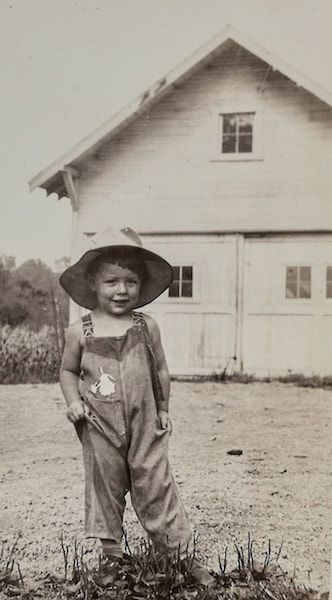
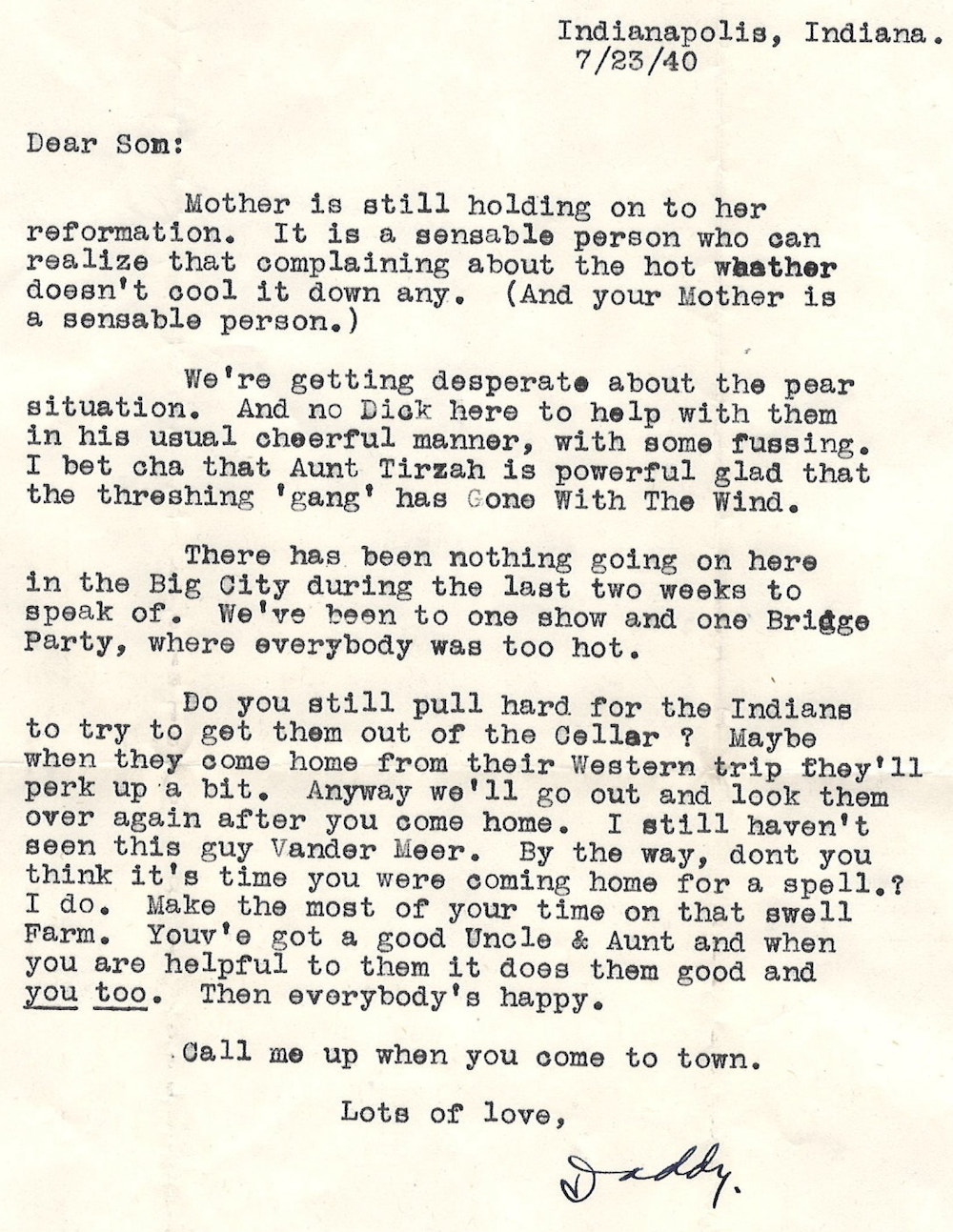
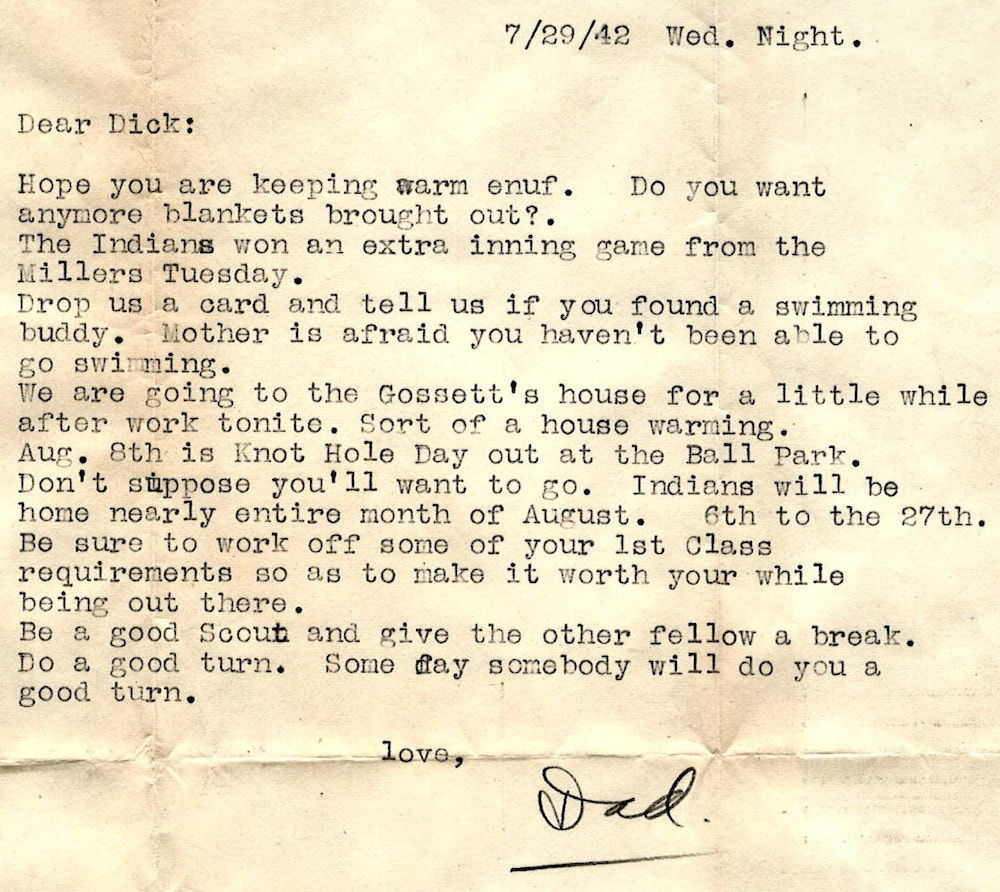
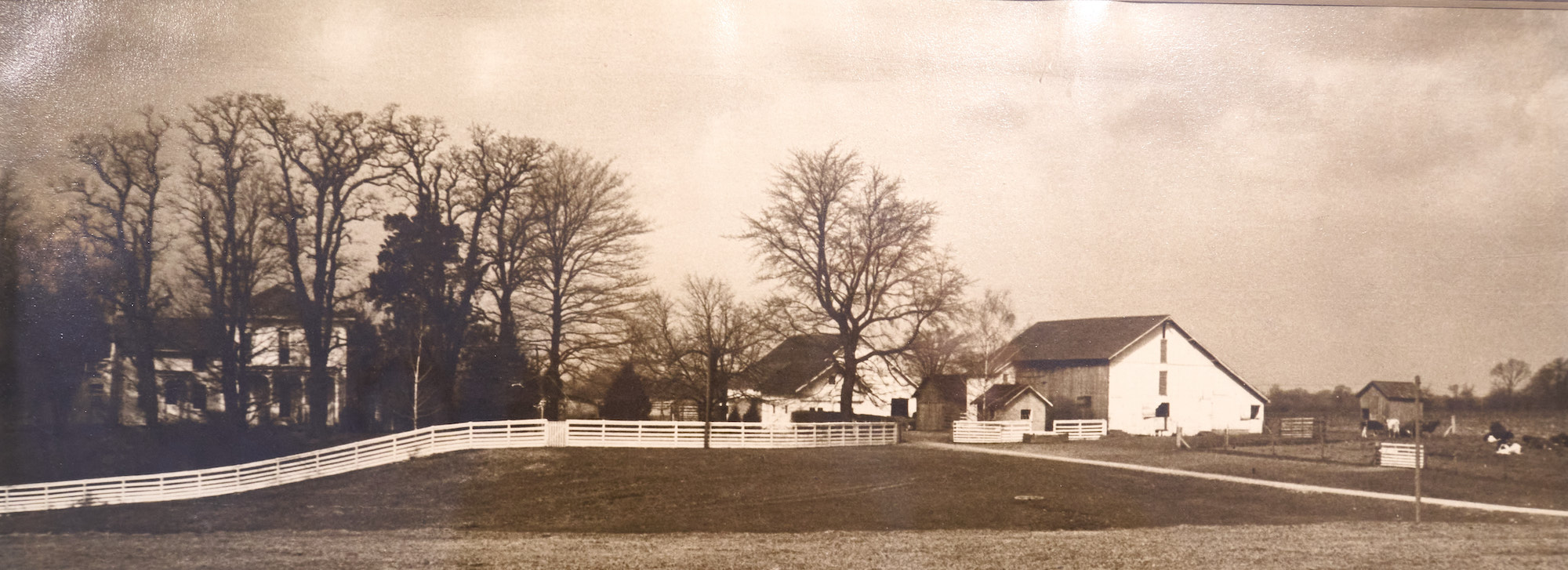
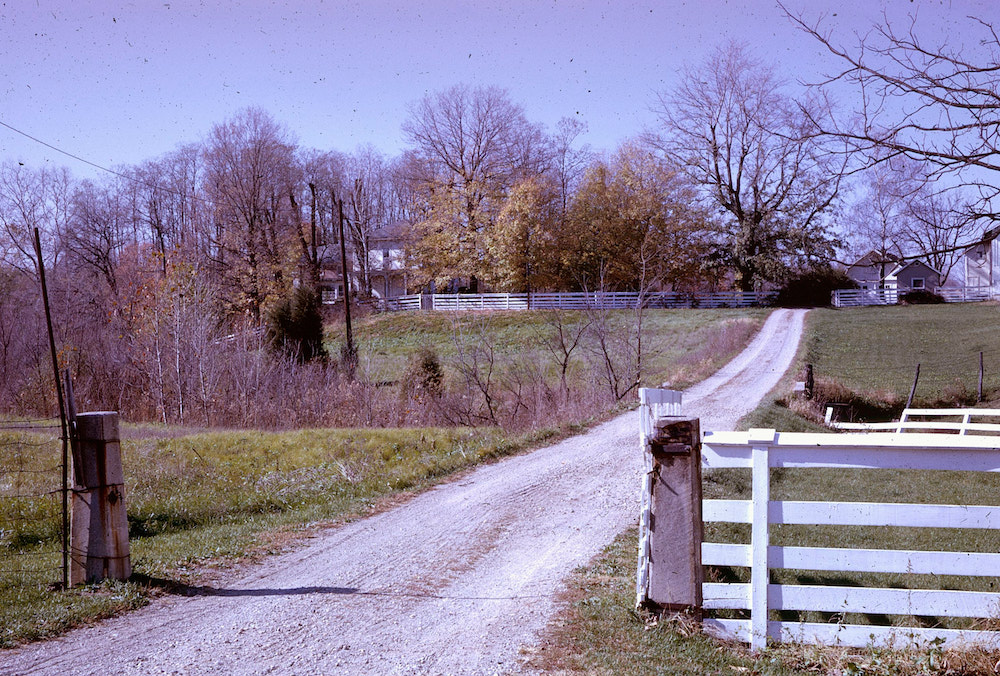
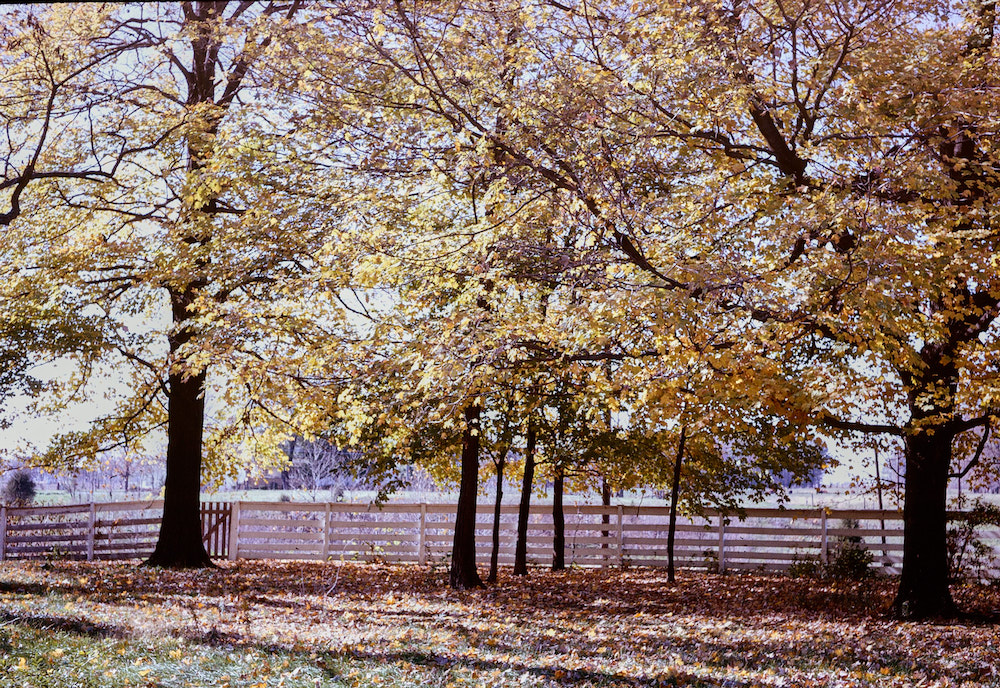
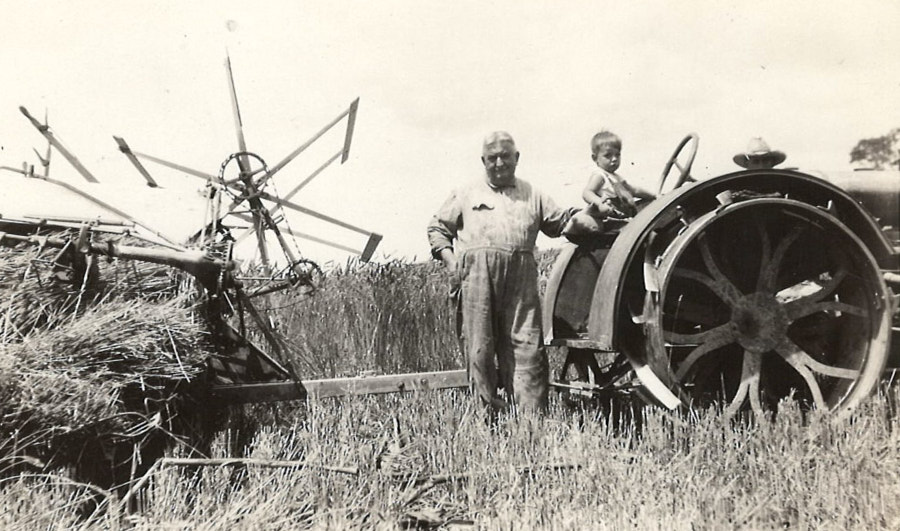
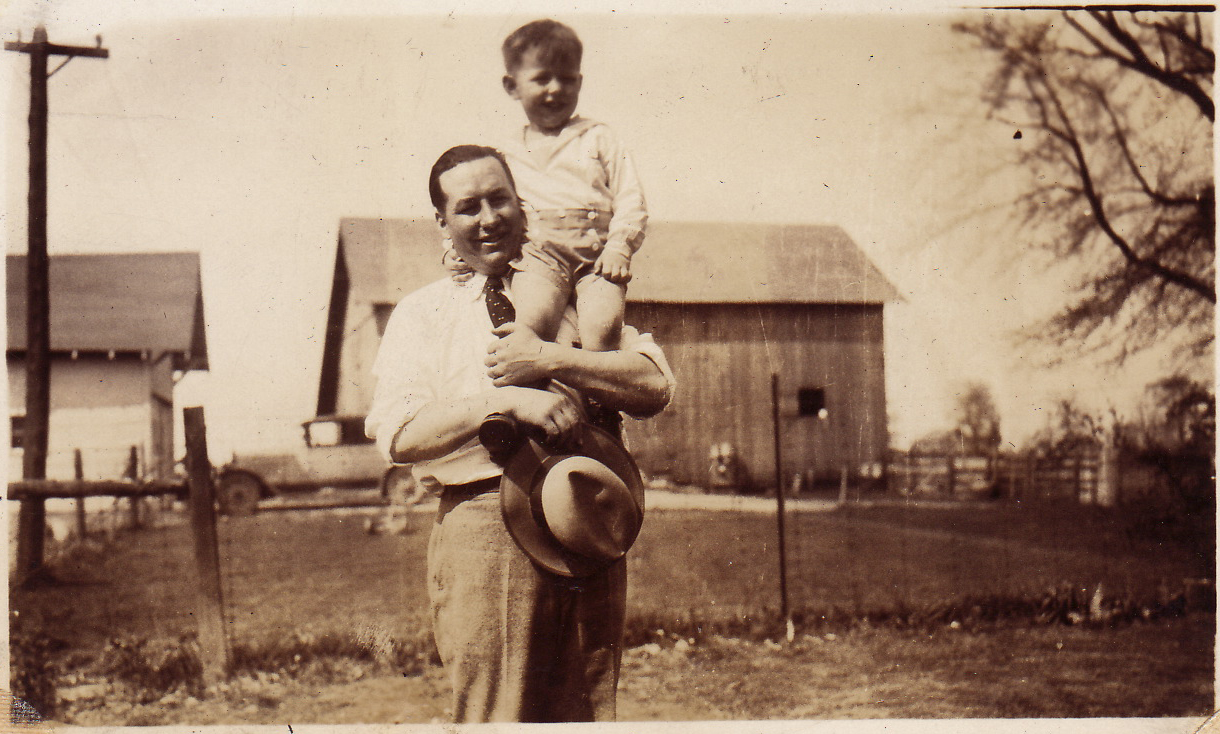
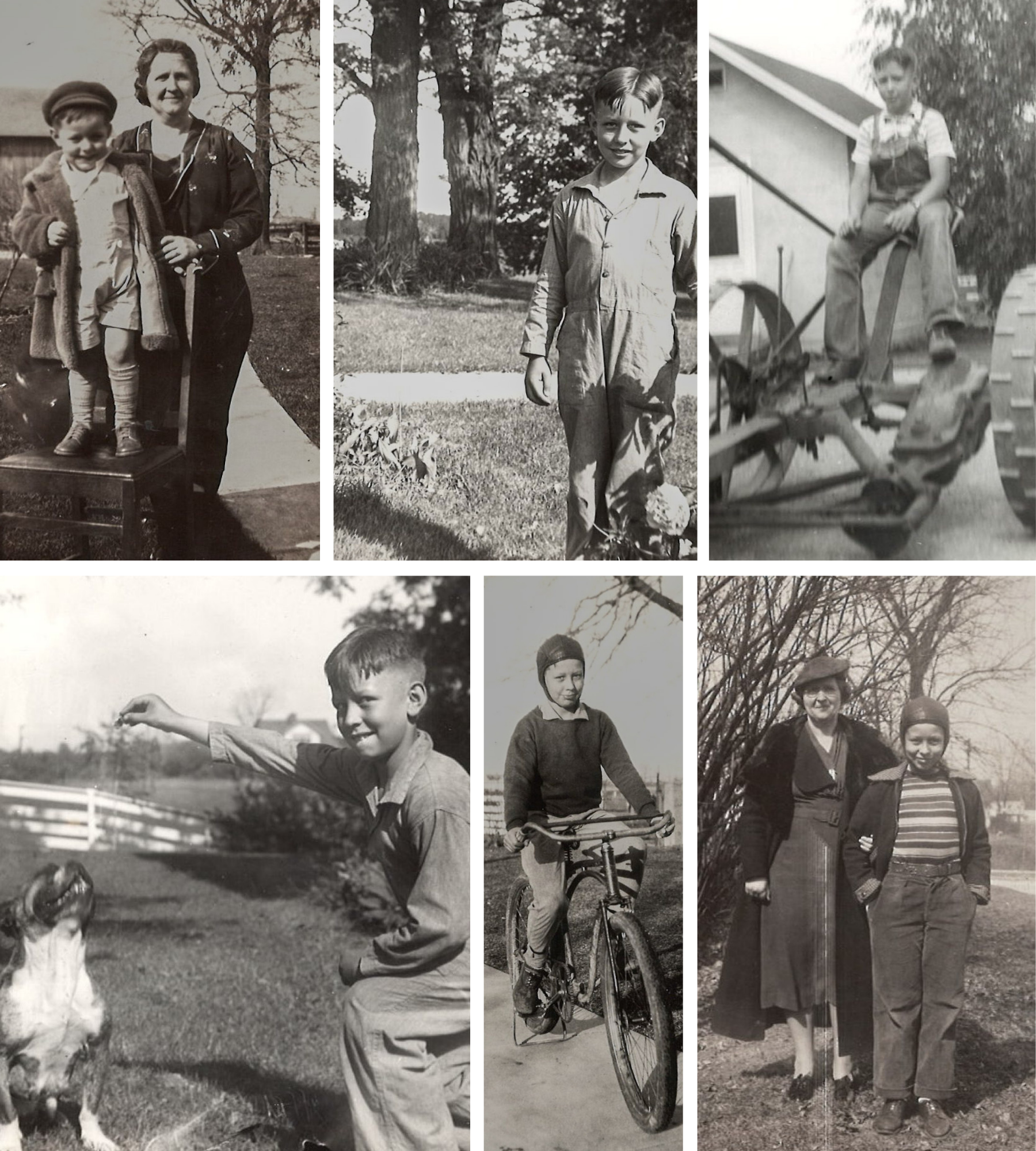
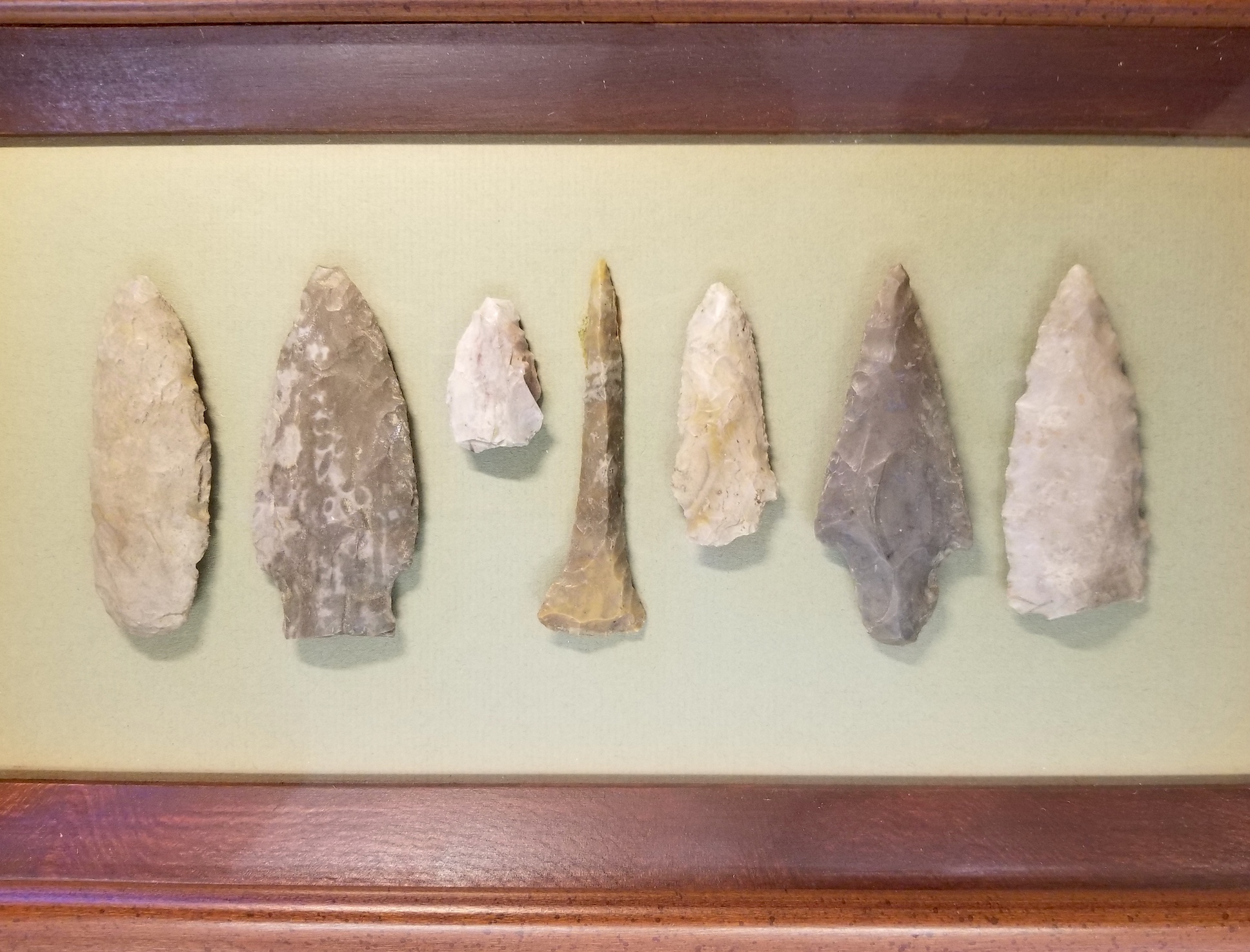
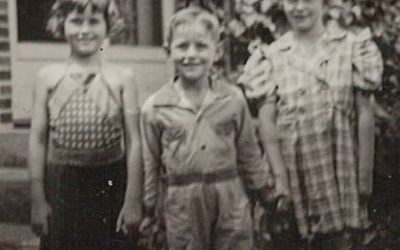
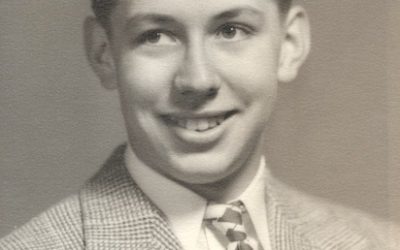
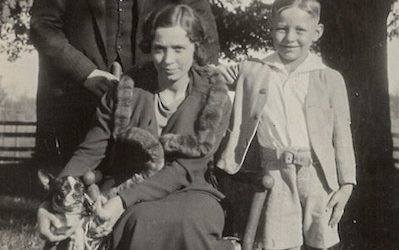
0 Comments